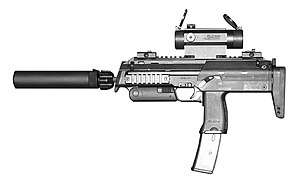Presidential Security Force of Indonesia
The Presidential Security Force of Indonesia (Indonesian: Pasukan Pengamanan Presiden abbreviated "Paspampres") is the presidential security unit and secret service concerned with tasks related to close protection and escort for the head of state and VVIP in Indonesia, which includes the President of Indonesia, Vice President of Indonesia with their immediate families, former Presidents and Vice Presidents, and foreign heads of state visiting Indonesia. Paspampres is based in Jakarta[1], and its personnel are recruited from best-chosen officers, soldiers, seamen, marines, and airmen from special forces or special units within the Indonesian National Armed Forces (TNI) (and until 2000, from the Indonesian National Police).
| Presidential Security Force of Indonesia | |
|---|---|
| Pasukan Pengamanan Presiden | |
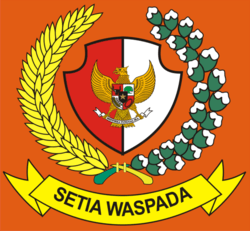 | |
| Founded | 3 January 1946 |
| Country | |
| Branch | Army, Navy, Marines, and Air Force |
| Type | Protective security unit |
| Role |
|
| Size | 4 Regiments (1 Brigade) |
| Part of | |
| Garrison/HQ | Jakarta |
| Motto(s) | Setia Waspada (Loyal and Vigilant) |
| Beret colour | Light Blue |
| Website | www.paspampres.mil.id |
| Commanders | |
| Commandant of the Paspampres | Major General Maruli Simanjuntak |
| Deputy Commandant | Air commodore Deny Muis |
History
The formation date of the Presidential Security Force (Paspampres) is based on the operation to evacuate President Sukarno, Vice President Mohammad Hatta, Prime Minister Sutan Syahrir as well as several ministers and high-ranking government officials from Jakarta to Yogyakarta on the 3 January 1946, This operation was based on the safety concerns of the President and VIPs about the allied forces intimidation in Jakarta. The rescue operation was conducted using the Kereta Luar Biasa a code-name for the special Presidential train. This date is commemorated as Hari Bhakti Paspampres or Paspampres Service Day.[2][3]
The formation of a formal force dedicated to protecting the Indonesian president only came after several assassination attempts on President Sukarno. On 6 June 1962 a special regiment known as the Tjakrabirawa Regiment, was formed to protect the president and his family. June 6 was also the birthday of President Sukarno. Tjakrabirawa (read "Chakrabirawa") consisted of personnel from the army, navy, air force and police. In 1966, Resimen Tjakrabirawa was dissolved due it taking part in an army-led abortive coup d'état in 1965 (the 1st Battalion's CO, Lieutenant Colonel Untung Syamsuri, led the coup attempt and its members carried out the kidnappings of army generals who were later murdered) and the protection of the president was entrusted to a military police special task force in 1966.[4][5]
A new presidential protection force named Paswalpres (an abbreviation from Pasukan Pengawal Presiden or "Presidential Escort Force") was formed on the 13th of January 1976, under the command of the Minister of Defence and Commander of the Armed Forces. This force was renamed in 1988 becoming the current Paspampres. Today, Paspampres has the strength of about 2,500 personnel and is headed by a two-star general/admiral/marshal from the TNI.
Responsibility and Tasks
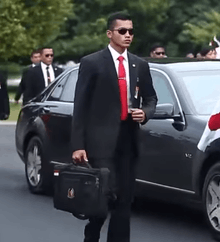
Responsibility
According to the Government Regulation (PP) of The Republic of Indonesia No. 59 Year 2013, The Presidential Security Force (Paspampres) are the troops in charge to carry out direct physical security at close range at any time towards the:
- President and Vice President along with their immediate family,
- Former President and Former Vice-President,
- Foreign Heads of state/Heads of government visiting Indonesia, and to conduct
- State-protocol duties in order to support the main tasks Indonesian National Armed Forces.[6]
Specific security duties conducted by the Paspampres for the VVIP also include:
- Personal security;
- Installation security;
- Activity security;
- Rescue security;
- Food safety;
- Medical security;
- News security; and
- Escort.[7]
Tasks
Currently, the main tasks of Paspampres are to:
- Provide protection for the VVIP and to ensure the safety of the VVIP from any immediate danger,
- Secure installations which include security personnel, material, and all facilities used by the VVIP,
- Perform emergency rescue of the VVIP,
- Perform direct security in close distance from all forms of threats to the VVIP while traveling,
- Ensure the safety of food and medically-related materials consumed by the VVIP,
- Perform special state protocol duties (Honour guard and Presidential Band during State visits and other state occasions if required)
Organisation
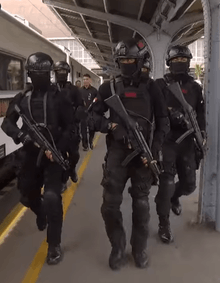
The organisation of Paspampres are as follows:[3]
- Leadership element, consist of the Commandant and Deputy Commandant
- Leadership assistance element, consist of Inspectorate, Planning Staff, Intelligence Staff, Operations Staff, Personnel Staff and Logistics Staff.
- Staff service element, consist of Chief of Staff, Secretariat and Headquarters Detachment.
- Executive element agency, consist of Densi, Denkomlek, Denkes, Denpal, Denbekang and Pusdalops.
- The Special Security Detachment (Denpamsus), which performs daily duties, such as close protection towards the President and Vice President and his family. The Special Security Detachment consists of:
- Commando Group (Pokko)[1], each of the groups is commanded by a colonel.
- GROUP A, a power of 4 Detachments, conducts close-range physical security towards the President and his/her family. Group A is also responsible for Guard mounting duties in Merdeka Palace, and the usual ceremony on the parade grounds every 2nd Sunday of the month has been recently moved outside the palace, resulting in a rising public interest[8] in the ceremony from visitors from Indonesia and overseas.
- GROUP B, a power of 4 Detachments, conducts close-range physical security towards the Vice President and his/her family.
- GROUP C, in charge of close-range physical security towards foreign VVIPs during their visit in Indonesia. This unit also consists of 1 training detachment in charge of training and fostering the ability of Paspampres personnel
- GROUP D, a power of 4 Detachments carrying out close physical security towards former Presidents and Vice Presidents and their families
- Private Escort Company (Ki Walpri)
- Special Security Company (Ki Pamsus)
- Debarment Platoon (Ton Kiran)
- Commando Group (Pokko)[1], each of the groups is commanded by a colonel.
- State Protocol Escort Battalion (Batalyon Pengawal Protokoler Kenegaraan abbreviated "Yonwalprotneg"), are personnel of Military Police which has the tasks for conducting state protocol duties such as Honour guard duties, Public duties, Guard mounting and escort. It has 590 personnel and each battalion is assigned operationally to the 4 Groups. This battalion is also responsible for the external security of the residences of the President and Vice President.
- The Special Security Detachment (Denpamsus), which performs daily duties, such as close protection towards the President and Vice President and his family. The Special Security Detachment consists of:
Reporting sub-units
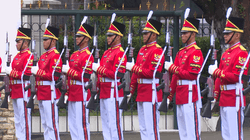
- Presidential Band
- Group A Presidential Honor Guard Battalion
- Group B Vice Presidential Honor Guard Battalion
- Protocol and Honor Guard Battalion Bogor Palace
- Protocol and Honor Guard Battalion National Palaces of Jakarta (Independence and State Palace)
- Horse Guards Troop and State Coach Troop (raised 2015)
- State Lancer Guard Troop (raised 2016)
- National Color Guard Company (raised 2016, reports to HQ)
Recruitment
Paspampres personnel are recruited and selected from the Indonesian National Armed Forces (Army, Navy (including Marines), and Air Force).[1] The recruits are usually selected from special forces and special units, such as (Kopassus, Kostrad, Raider Infantry Battalions (including Kostrad Parachute Raiders and Mechanized Raiders), Paskhas, Kopaska, Denjaka, Taifib) and Marines, as well as military policemen. Each individual gets rigorous military training (sharp shooting, tactical combat, diving) and special martial arts training, such as Yong Moodo, Pencak Silat, Tarung Derajat, Mixed Martial Arts, and Aikido. All Paspampres personnel are required to be proficient in at least in one of the martial arts, and it was proven by becoming second winners in the World Yong Moodo (Korean martial arts) Championship 2013[9]. Paspampres personnel must carry out their duties with a high level of vigilance against any possible threat and are prepared to sacrifice their own life if required for the President, Vice President, and VVIP.[10][11]
Protocol duties
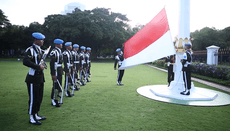
Guard of Honor
Paspampres as a special joint service command of the TNI, other than being responsible for implementing security for the President, Vice President of Indonesia and VVIPs also carries out special protocol duties at state-level ceremonies such as conducting Honour Guard, public duties, quarter guard and guard mounting tasks for the national official residences during state visit ceremonies.
These ceremonial duties of Paspampres is usually assigned towards personnel of the "State Protocol Escort Battalion" (Batalyon Pengawal Protokoler Kenegaraan abbreviated "Yonwalprotneg"), a detachment of Paspampres consisting of chosen Military policemen from the Military Police Corps of Indonesia. This unit also becomes the Cordon Guard during the arrival ceremony at the airport apron during a state visit and also becomes the main Honour guard during a state funeral.
The uniform worn by the Paspampres Honour guard is a red long sleeved full dress uniform with a white buff belt worn on the upper waist, white trousers with white parade boots and a black shako as the headdress. During certain ceremonies such as a state funeral or changing of the guard ceremony, a light blue beret is worn instead for the headdress. During the night, a black trouser is worn.
Presidential band
The Paspampres presidential band is a military band tasked for playing the national anthems during a State visit ceremony and performs music accompaniment during state-level receptions or banquets in the palaces and other official locations when the head of state is present.
Equipments
Weaponry
Vehicles
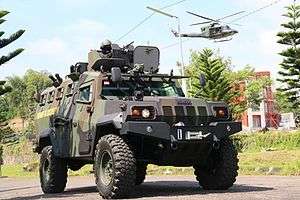
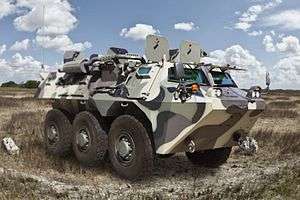
 Yamaha FZ1 used by the armed side-escort for the President's car
Yamaha FZ1 used by the armed side-escort for the President's car Honda Gold Wing used by the front escort
Honda Gold Wing used by the front escort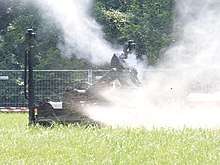 tEODor Explosive Ordnance (EOD) Robot
tEODor Explosive Ordnance (EOD) Robot
References
- Combat Handgun, October 2008. Pages 72-74.
- http://kaltim.tribunnews.com/2018/01/03/mengulik-sejarah-terbentuknya-paspampres-berawal-dari-perintah-rahasia-bung-karno?page=1
- http://ppid.tni.mil.id/view/32435663/sejarah-paspampres.html
- http://wartakota.tribunnews.com/2017/09/23/satu-peleton-cakrabirawa-dibubarkan-terlibat-kasus-g30spki
- Ricklefs, M.C. (2008) [1981]. A History of Modern Indonesia Since c.1300 (4th ed.). London: MacMillan. pp. 437–438. ISBN 978-0-230-54685-1.
- Government Regulation (PP) of The Republic of Indonesia No. 59 Year 2013 (PP No. 59 tahun 2013)
- Article 3, Chapter II, Government Regulation (PP) of The Republic of Indonesia No. 59 Year 2013 (Pasal 3 Bab II PP No. 59 tahun 2013)
- http://www.paspampres.mil.id/id/berita-dan-event-paspampres/serah-terima
- http://www.tni.mil.id/view-60898-anggota-paspampres-borong-medali-di-korea-selatan.html
- http://jogja.tribunnews.com/2017/04/18/menilik-tugas-dan-tanggung-jawab-paspampres-pasukan-khusus-yang-siap-mati-demi-sang-presiden
- Tentang PASPAMPRES - MetroTV 360 bag 1 (video) (in Indonesian). 2013. Retrieved June 22, 2014.
- https://www.merdeka.com/peristiwa/bukan-koper-biasa-ini-senjata-andalan-paspampres-lindungi-jokowi.html
External links
- Official Website
- Paspampres video 1
- Paspampres video 2
- State Protocol Escort Battalion (Yonwalprotneg), Paspampres video 3
- Paspampres shooting exercise
| Wikimedia Commons has media related to Presidential Security Force of Indonesia. |
.jpg)
